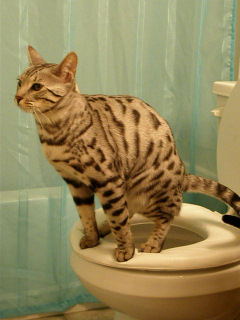Hazards of Flushing Cat Poop Down Your Toilet - Prevent Potential Issues
Hazards of Flushing Cat Poop Down Your Toilet - Prevent Potential Issues
Blog Article
We have stumbled upon this article about How to Dispose of Cat Poop and Litter Without Plastic Bags below on the web and concluded it made good sense to talk about it with you over here.

Introduction
As feline proprietors, it's important to be mindful of exactly how we get rid of our feline pals' waste. While it might seem practical to flush pet cat poop down the toilet, this method can have detrimental repercussions for both the setting and human health and wellness.
Alternatives to Flushing
Thankfully, there are much safer and a lot more liable ways to deal with cat poop. Take into consideration the adhering to options:
1. Scoop and Dispose in Trash
The most usual technique of throwing away cat poop is to scoop it right into an eco-friendly bag and throw it in the garbage. Make sure to use a devoted clutter inside story and deal with the waste immediately.
2. Use Biodegradable Litter
Choose eco-friendly pet cat litter made from materials such as corn or wheat. These litters are environmentally friendly and can be safely dealt with in the garbage.
3. Hide in the Yard
If you have a lawn, think about hiding cat waste in an assigned location far from vegetable gardens and water sources. Be sure to dig deep sufficient to avoid contamination of groundwater.
4. Set Up a Pet Waste Disposal System
Purchase a pet dog garbage disposal system especially developed for pet cat waste. These systems use enzymes to break down the waste, minimizing odor and environmental influence.
Health and wellness Risks
In addition to ecological problems, flushing pet cat waste can also pose wellness dangers to human beings. Pet cat feces might consist of Toxoplasma gondii, a bloodsucker that can create toxoplasmosis-- a possibly extreme health problem, especially for expectant women and people with damaged body immune systems.
Ecological Impact
Flushing cat poop introduces hazardous pathogens and bloodsuckers right into the water supply, posturing a substantial danger to water ecological communities. These pollutants can adversely affect aquatic life and compromise water high quality.
Conclusion
Liable pet dog ownership expands beyond giving food and shelter-- it also involves appropriate waste monitoring. By refraining from flushing cat poop down the commode and choosing different disposal methods, we can minimize our ecological footprint and shield human health and wellness.
Why Can’t I Flush Cat Poop?
It Spreads a Parasite
Cats are frequently infected with a parasite called toxoplasma gondii. The parasite causes an infection called toxoplasmosis. It is usually harmless to cats. The parasite only uses cat poop as a host for its eggs. Otherwise, the cat’s immune system usually keeps the infection at low enough levels to maintain its own health. But it does not stop the develop of eggs. These eggs are tiny and surprisingly tough. They may survive for a year before they begin to grow. But that’s the problem.
Our wastewater system is not designed to deal with toxoplasmosis eggs. Instead, most eggs will flush from your toilet into sewers and wastewater management plants. After the sewage is treated for many other harmful things in it, it is typically released into local rivers, lakes, or oceans. Here, the toxoplasmosis eggs can find new hosts, including starfish, crabs, otters, and many other wildlife. For many, this is a significant risk to their health. Toxoplasmosis can also end up infecting water sources that are important for agriculture, which means our deer, pigs, and sheep can get infected too.
Is There Risk to Humans?
There can be a risk to human life from flushing cat poop down the toilet. If you do so, the parasites from your cat’s poop can end up in shellfish, game animals, or livestock. If this meat is then served raw or undercooked, the people who eat it can get sick.
In fact, according to the CDC, 40 million people in the United States are infected with toxoplasma gondii. They get it from exposure to infected seafood, or from some kind of cat poop contamination, like drinking from a stream that is contaminated or touching anything that has come into contact with cat poop. That includes just cleaning a cat litter box.
Most people who get infected with these parasites will not develop any symptoms. However, for pregnant women or for those with compromised immune systems, the parasite can cause severe health problems.
How to Handle Cat Poop
The best way to handle cat poop is actually to clean the box more often. The eggs that the parasite sheds will not become active until one to five days after the cat poops. That means that if you clean daily, you’re much less likely to come into direct contact with infectious eggs.
That said, always dispose of cat poop in the garbage and not down the toilet. Wash your hands before and after you clean the litter box, and bring the bag of poop right outside to your garbage bins.
https://trenchlesssolutionsusa.com/why-cant-i-flush-cat-poop/

I'm just very intrigued by Can You Flush Cat Poop Down The Toilet? and I am hoping you enjoyed reading my blog entry. Sharing is good. Helping people is fun. Thank you for taking the time to read it.
Get Quote Report this page